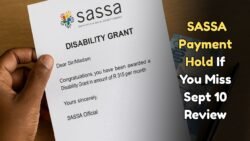NSFAS 2025 Funding – The National Student Financial Aid Scheme (NSFAS) remains one of the most critical support systems for South African students, ensuring that thousands of learners can access higher education without financial strain. With the 2025 academic year approaching, NSFAS has reminded students that the funding deadline is nearing, and all eligible applicants must complete their submissions in time to avoid being excluded from the September allowance payout. The September disbursement, which includes the R5,200 allowance for living expenses, is a lifeline for many students who depend on these funds for accommodation, meals, and transport. Missing the deadline could mean losing out on crucial support, leaving students scrambling to cover basic costs. Universities and colleges across the country are also urging learners to take this deadline seriously, as delayed applications may not be considered. To ensure a smooth process, students are encouraged to prepare all required documents early and check their application status regularly on the official NSFAS platform.
Why the September R5,200 Allowance Matters for Students
For many South African students, the R5,200 monthly allowance offered by NSFAS is not just a financial supplement but an essential means of survival while pursuing their academic goals. This amount covers a range of critical expenses, from food and transport to study materials and rent. Without this financial aid, students from low-income households would struggle to meet their day-to-day needs, and in some cases, may even be forced to abandon their studies. The September allowance is especially important as it aligns with the start of the second semester, a time when students often face heightened academic demands and increased expenses. By ensuring applications are submitted before the cutoff, students can secure their funding and focus on their studies rather than being distracted by financial hardship. Universities have highlighted that financial stress remains one of the leading reasons students drop out, making NSFAS allowances a crucial safeguard.
Application Process and Common Mistakes to Avoid
Applying for NSFAS funding requires careful attention to detail, as even small errors can result in delays or rejections. Students must submit personal documents, such as certified copies of their ID, proof of household income, and academic records. One of the most common mistakes applicants make is waiting until the last minute, which increases the risk of technical issues on the system or missing essential requirements. Another frequent error is failing to update contact details, meaning students may miss important notifications from NSFAS. Applicants should also double-check that all supporting documents are valid and not expired, as outdated information can cause disqualification. The process is entirely online, accessible through the NSFAS portal, which simplifies submissions but requires stable internet access. Students are strongly advised to use reliable devices and networks to complete their applications early, giving them enough time to correct any potential mistakes before the official closing date.
How Institutions Are Supporting Students with NSFAS Applications
Recognizing the challenges that many students face when navigating the NSFAS portal, universities and TVET colleges have put additional support measures in place. Many institutions have set up help desks and financial aid offices where students can receive guidance on completing their applications correctly. Some universities also organize workshops and awareness campaigns to ensure learners understand the importance of submitting on time and the steps involved. In rural areas, community outreach programs are helping students with limited internet access to apply using campus facilities. This collaborative effort ensures that no student is left behind due to lack of resources or knowledge. Institutions emphasize that students should not hesitate to seek assistance, as staff members are trained to address common issues like uploading documents, correcting errors, and confirming submission. These initiatives highlight the shared responsibility between NSFAS, institutions, and students in ensuring that education remains accessible and inclusive.
Consequences of Missing the NSFAS 2025 Deadline
Failing to apply for NSFAS before the deadline has serious consequences for students. Those who miss out may be required to cover tuition fees, accommodation, and living costs entirely on their own, which can be financially impossible for many households. This often results in students being excluded from classes due to unpaid fees or forced to drop out altogether. The absence of the September allowance, which provides R5,200 for living expenses, can push students into extreme financial hardship, leaving them unable to afford food, transport, or essential study resources. Additionally, late applicants are not guaranteed consideration for future disbursements, meaning their entire academic year could be affected. NSFAS has made it clear that extensions are unlikely, as deadlines are strictly enforced to ensure timely processing and fair allocation of funds. Therefore, students are urged to act immediately, safeguard their academic future, and avoid unnecessary setbacks by meeting the 2025 funding deadline.





